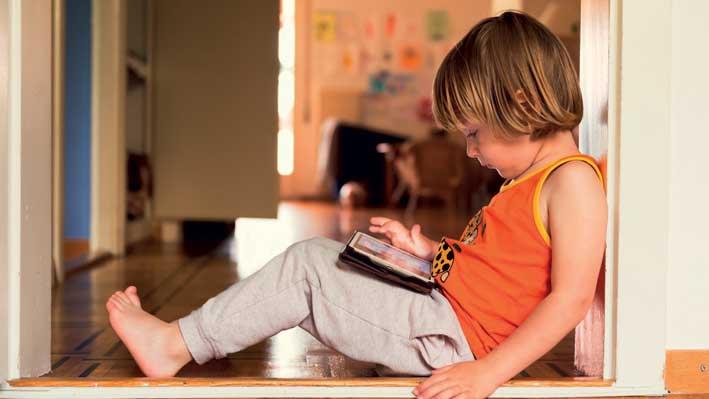Technology creators and bosses imposed almost total restrictions on their children's use of gadgets because they had concerns about the benefits. Now a certain social messaging sector is targeting six-year-olds.
Not that long ago Steve Jobs, the Apple boss, limited his children's tech use and did not allow them to have iPads, indicating he was worried about the effects of exposing children to technology. His colleague, Jonathan Ive, who designed an iPad that was simple enough for a toddler to operate, set heavy limits on his twin sons' use of technology. And Bill Gates, founder of Microsoft, banned his children from having mobiles until they were 14.

Less than a decade later a social media website Facebook is under fire because their lax security allows children below their minimum age of 13 to access the site and to set up their own social media profiles. Many websites do not demand proof of age when someone signs up. Instead, most ask for a user to enter their birth date, which can be easily faked. Facebook-owned Instagram does not even demand proof of age when users sign up. It only tells them that by signing up, they have agreed to its terms and conditions, including its lower age limit.
And now Facebook is targeting children as young as six - an age when live social interaction among their peers could not be more important.
Young children have already become so glued to their gadgets they are displaying physical symptoms of over exposure, such as RTS injuries and tantrums when the appliance won't work, or has to be put down at certain times.
A report in Digital Childhood says children should be taught the risks of smart phones before the age on five. Based on what? Their wide experience of life in our times, or the immense knowledge of human nature they will have acquired by then? Oh please. Online hazards and crimes are difficult enough for adults to cope with never mind a pre-schooler.
But, in America, and coming to a country near you as its success expands, is Facebook's Messenger Kids described as a step in the right direction to providing safe, age-appropriate platforms for younger children. Loren Cheng, the product management director, claims it was launched to meet parents' demand.
Certainly parents, indeed all of us, acknowledge that mobile technology plays an irreplaceable part in our lives. To say we would be lost without it is, for too many, an understatement.
But when the sort of demands and pressures of many of these sites are known to be tormenting teenagers and other young people, who discover they are anything but the 'inclusive and sharing' platforms they had hoped for, are they really something little children need at all?
We should lead by example by limiting our own use of mobile technology when children are around and teaching them bit by bit, when they can understand the concepts, how, why and when we can use it without either falling into a bad place, or missing out on a real life.
It allows children aged six to 12 to send pictures and texts and video chat just like Facebook's main messaging platform.
Site users do not see adverts. There are supposedly strict controls in place. Children can only use the service if a parent with a Facebook account sets it up on their behalf.

Parents then add contact to their child's account from their friend list.
They can then add contacts to their child's account from their own friend list.
Adding relatives or family friends, who are already Facebook friends with the parents is simple.
But a child can only add a school friend who also uses the app. And their parents will also have to become Facebook friends.
When a child reaches 13, his or her account on Messenger Kids will automatically migrate to Facebook.
Security
Facebook bends over backwards to assure parents that the app was developed using 'parents' and 'experts in parenting' to keep children safe, and to give the parents of young children a level of control; accent on the word 'level'.
Web giants are currently under pressure to install tighter controls for children under 18, so they do not share their location or see adverts. Privacy settings should be set at the highest possible level, by default.
But Facebook doesn't even control all the grievous abuse on its main platform effectively.
And although only parents can approve contacts and can monitor their children's messaging closely, there is no guarantee that the children won't be able to find ways around the system; or that busy or trusting parents will not let their guards down after a while. Then who will pick up the pieces? Facebook's record in monitoring and controlling abuse and cyber-bullying leave a lot to be desired.
Reference the discovery that the company has had insufficient controls in place to prevent another developer from collecting data which automatically generates profiles of children, without their consent.
And on the subject of data, promising that it's collection of children's data on Messenger Kids will be limited says nothing. Parents are entitled to a detailed explanation of what type of data the company will collect, how it will be collected and how it will be used.
Generating ads is out, so far, but one has to wonder what sort of data such young children will provide that the company even need to have.
Messenger Kids, is clearly here to make sure the brand name is instilled at an early age. Sometimes the saying 'catch them when they're young' has a distinctly sinister ring to it.
